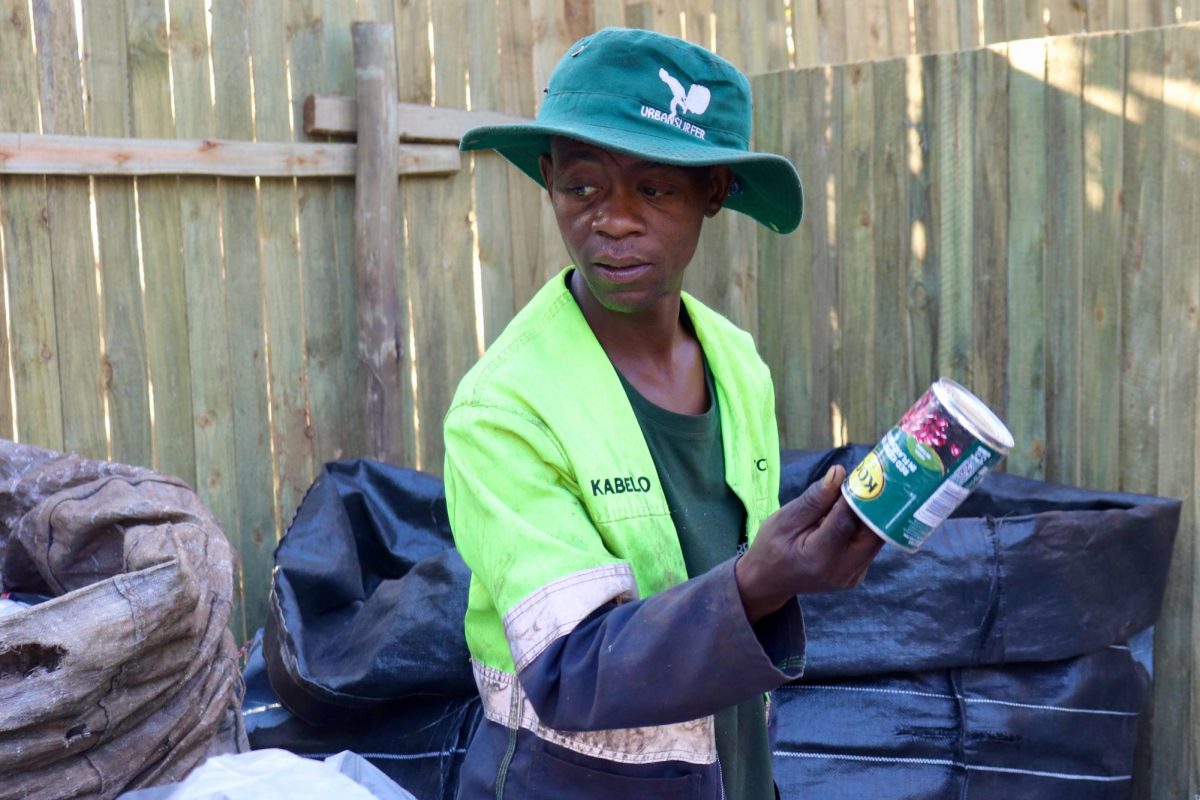Johannesburg, South Africa – In the shadow of a multi-story office building, eight men emerge from a small wooden cabin at 4 a.m. each Monday through Thursday. They don reflective jumpsuits and head to the streets to gather discarded plastics, aluminum cans, paper and glass.
At the end of their workday, they will return to their camp in Parktown, a suburb on the northern end of Johannesburg, having collected just over one ton of recycled materials from residential and industrial garbage bins placed outside homes and businesses. On Fridays, the men sort their haul.
In South Africa, these men, known as “reclaimers” or “waste pickers,” are responsible for 80%-90% of recycling management in Johannesburg and across the country. They are not employed by municipalities, which are widely criticized for not adequately funding or prioritizing waste management, including recycling operations.
Instead, the reclaimers have organized themselves, said Sifiso Gumbi, a former reclaimer who oversees recycler relations for the nonprofit Urban Surfer South Africa.
“They’ve established their own informal system,” Gumbi said. “The guys have a network and a system of working that they established themselves.”
Gumbi founded Urban Surfer in 2019 to provide support to reclaimers and their families.
“Waste pickers are at the very bottom of the chain, but they play the most crucial role,” said Gumbi. “These people are self-employed, and they should be supported.”
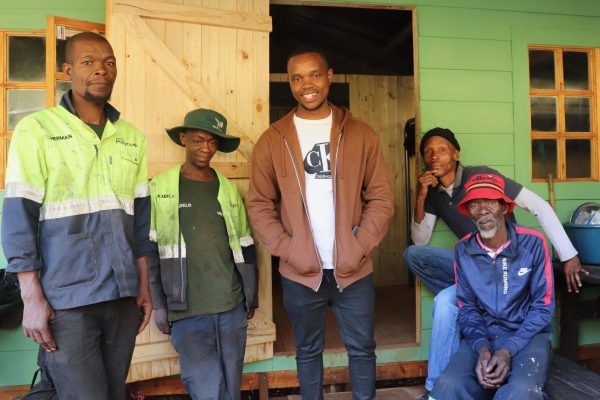
Located along the busy M1 highway, the reclaimer camp where the eight men sleep and sort their recyclables is the first of its kind in South Africa, according to Gumbi. Construction of the cabin and surrounding wooden walling began April 10 and was completed April 29.
At one end of the camp, there is a solar-powered baler and stacking area, followed by designated stalls for each man to sort what they collect. These stalls are filled with black heavy-duty polypropylene bags for each type of recyclable. At the other end of the camp is a camping stove, the cabin, an outdoor shower and a toilet.
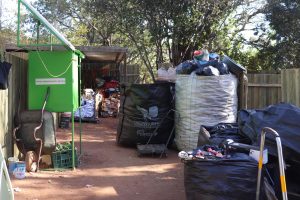
“Before we were out in an open space and this helps,” said Kabelo, one of the men living in the camp who asked that only his first name be used. Kabelo has been a reclaimer for 10 years. By early afternoon one day in mid-June, his phone had logged over 25,000 steps.
There’s no official data on how many reclaimers there are in South Africa, but they can be seen everywhere, pushing carts piled high with waste along city and township streets. Many are unhoused or undocumented and have no other formal employment. Most reclaimers live unsheltered on the streets, “curled with the rats,” said Gumbi.
Urban Surfer guesses there are about 140,000 reclaimers in South Africa, each recycling about 24 tons per year.
Gumbi rattled off nicknames for each type of recyclable material as he showed visitors around the camp one afternoon.
“The most valued recycled material is aluminum,” Gumbi said, pointing to a black bag full of crushed cans. “This is gold. That’s why you won’t find as many cans laying around. Paper’s the least valuable, but paper is still valuable. You know why? Because recycling is a game of volume.”
Pat, who asked only to be identified by his first name, said he used to sleep under a bridge before the opening of the Parktown camp.
“Camp has improved our living conditions, and it brings back our dignity,” Pat said. “[We] need money to feed and support ourselves and support our loved ones. COVID-19 hit us so bad. Some of us lost our jobs, which was our main source of income.”
The unemployment rate in South Africa was 32.9% for the first quarter of 2024, according to a Statistics South Africa’s quarterly labor force survey.
Pat, like many other reclaimers, said he resorted to waste reclaiming in order to provide for his family.
“It’s better than doing crime, so you find that a lot of people see it as the most attractive thing to do,” Gumbi said.
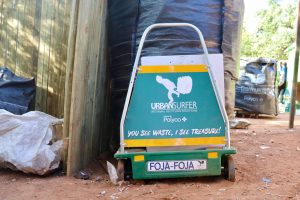
In addition to the camp, Urban Surfer also provides the men with GPS-tracking trolleys with their names on them, in an effort to personalize the identity of workers who are often ignored and dehumanized.
Two months after the camp opened, the eight men living in the reclaimer camp covered 373 miles, according to their trolleys. Gumbi said they have brought in an average of six to 10 tons of waste per week.
“Everything is data driven,” said John Kullmann, who is in charge of Design and Development at Urban Surfers. “The more data we got, the more ammo that we have going forward.”
Urban Surfer plans to use its verifiable data to expand the development of sustainable reclaimer camps and continue to increase public knowledge and visibility around waste reclaimers, Kullmann said.
“What we are trying to do is create sustainable self-employment for reclaimers,” Kullmann said. “If we can double a reclaimer’s income, that is what our mission is at the moment.”
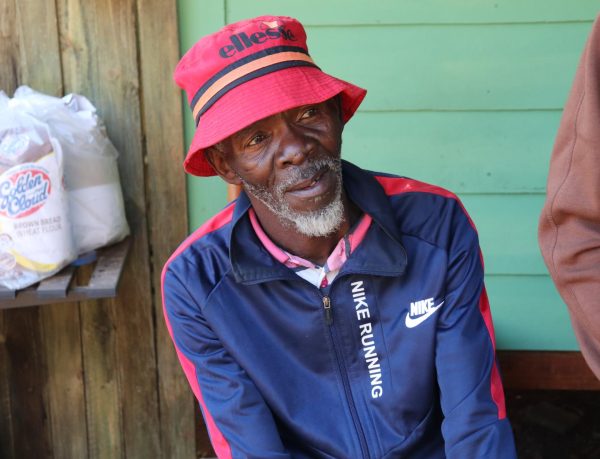
To help fund the camp, Urban Surfer partnered with Hollard Group, a privately-owned insurance and investment company that occupies the office building that sits on a hill above the camp, and Polyco, a nonprofit that promotes the use and reuse of plastic packaging by investing in organizations involved in recycling in South Africa.
“The partnership demonstrates the effectiveness of the Urban Surfer model, and creates a sustainable and dignified way for the reclaimers to earn an income,” wrote Kyle McWilliam, head of Group Shared Services at Hollard, in response to questions from The Hawk.
One Parktown waste reclaimer named Masiza, who is from the Eastern Cape, about 518 miles south of Johannesburg, said the biggest benefit of recycling is the ability to support his family and save money to make it home for Christmas each year. Masiza has been a reclaimer for 18 years, 15 of them at Parktown.
“The industry has never let me down,” Masiza said through a translator.
This story was updated to include a response from Hollard Group.













































